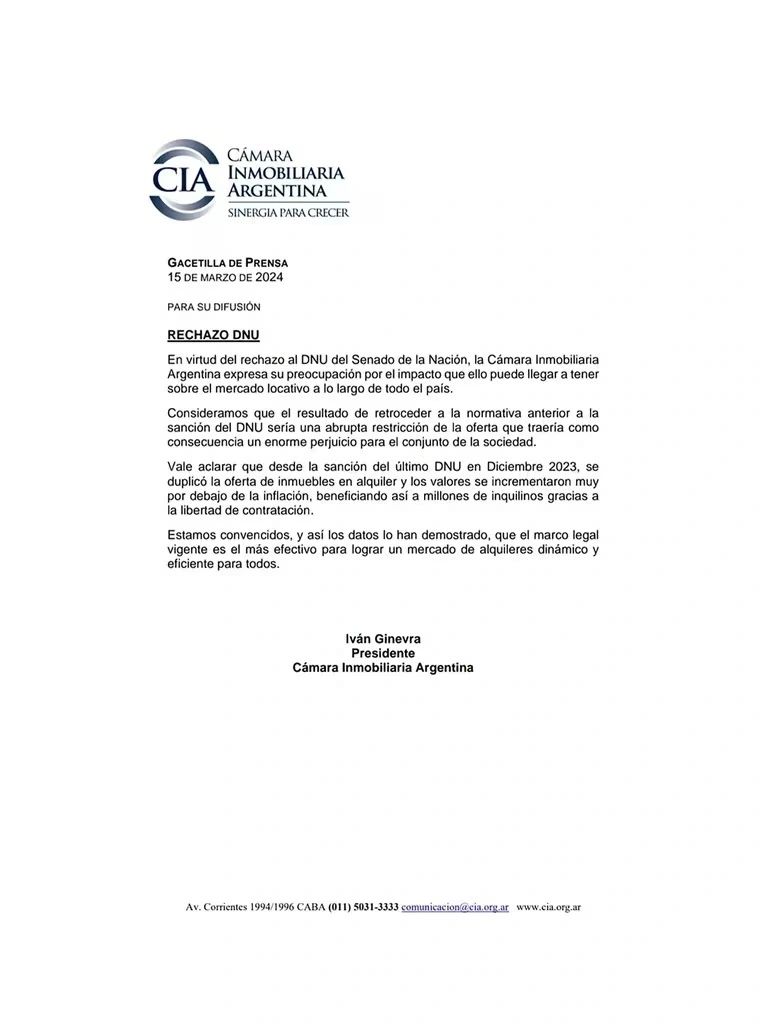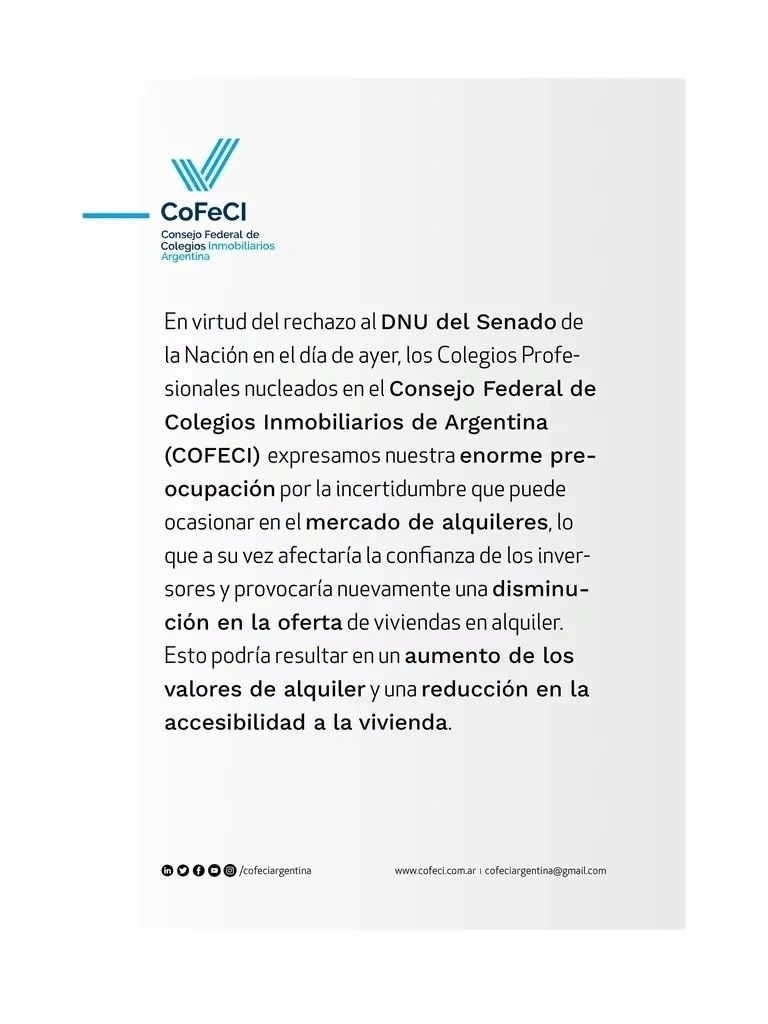BuySellBA
Administrator
Concern in the real estate sector due to the rejection of the DNU: They fear the withdrawal of rental properties and additional price increases - Infobae

Source:

Preocupación en el sector inmobiliario por el rechazo al DNU: temen el retiro de propiedades en alquiler y subas adicionales de precios
Tras el voto negativo del Senado a la norma que deroga la Ley de Alquileres, la atención se centra ahora en Diputados. Un aspecto crucial es el destino de los contratos de alquiler firmados desde fines de diciembre
March 17, 2024
After the Senate's negative vote on the rule that repeals the Rental Law, attention is now focused on Deputies. A crucial aspect is the destination of the rental contracts signed since the end of December
By Jose Luis Cieri

In their hands, a couple holds a miniature house, reflecting the current challenges in rentals and real estate under different regulations. An image that captures the essence of housing in times of inflation and legislative changes (Illustrative Image Infobae)
Two days after the Senate rejected the Government's DNU, in force since December 29, 2023, which covered various measures, including the repeal of the Rental Law of July 2020 and modified last October. This fact caused immediate reactions in the real estate sector.
The rejection of the DNU by the Senate generated a series of statements from various sectoral chambers, highlighting concerns about the possible negative repercussions on the real estate market. This comes at a crucial time, as property supply is experiencing notable growth, reaching record levels after a period of stagnation that lasted more than 12 months. According to different analyses, the supply has increased between 150% and 200% since the DNU came into force.
Now there are apartments in different Buenos Aires neighborhoods such as Mataderos, Villa del Parque, Santa Rita or Parque Patricios, when in November the offer was practically nil.
Alejandro Bennazar , former president and current director of Institutional Relations of the Argentine Real Estate Chamber (CIA), expressed to Infobae his concern about the immediate repercussions of this decision. Bennazar pointed out that the owners are waiting for what may happen in the Chamber of Deputies, “and many are already considering withdrawing their properties from the rental market. Additionally, he mentioned that this situation could trigger a significant increase in rental prices, which would result in insufficient supply to cover current market demand.

The statement from the Argentine Real Estate Chamber
Bennazar's analysis not only focuses on the present, but also projects possible consequences in the future. He highlighted that in the last four years, since the 2020 Rental Law came into effect to date, the market has registered considerable deterioration, which will require several months to be repaired.
However, he highlighted that during this period that the DNU governs, “the historical rental supply exceeded expectations, which has contributed to containing the increase in prices and even reducing them in some cases.”
Rental contracts signed as of December 29 remain in force until their end, as do those signed until the decision of Deputies. The DNU is still fully valid at this time
Despite this recent improvement, the Senate's rejection generated a wave of uncertainty among owners, developers and builders, who postponed sales operations and investment projects waiting to see what will happen in the Chamber of Deputies.
In Greater Buenos Aires, a slowdown in starting prices is observed, suggesting a growing consensus between owners and tenants around less regulated agreements. However, there is concern that if the Rental Law is returned, the supply of properties could decrease again and the few available would once again be published at excessive prices.
Since the start of the pandemic in March 2020, the real estate sector has faced a number of challenges due to decisions made by the Executive Branch and Congress.
Virginia Manzotti , president of the Federal Council of Real Estate Associations (CoFeCi), emphasizes the opposition of real estate brokers to state interventionism and agreements that restrict freedom of contract, rights enshrined in the Constitution and the Civil and Commercial Code of the Nation. “However, public powers have advanced measures that affect investor confidence, generating significant concern in an issue as delicate as housing and private property, which are always in tension due to legislative changes.”

Source: Federal Council of Real Estate Associations (CoFeCi)
The housing deficit, a problem that has been rooted in Argentina for decades, does not find a solution in legislative decisions that undermine investor confidence.
“The rejection of the DNU in the Senate once again sows uncertainty in the market, just when it seemed that it was being reactivated with a greater supply of rental homes. Once again, tenants and owners find themselves at the mercy of political decisions that seem to ignore those who have deep knowledge of the issue and who could provide more solid solutions,” said Manzotti.
Recommendations and validity of contracts
From the Real Estate Federation of the Argentine Republic (FIRA) they stated that they are attentive to recent legislative decisions and their influence on the rental market. “With the rejection of the DNU by the Senate, it is crucial for professionals in the sector to understand the implications of this action,” explained Emilio Caravaca Pazos , president of the entity.1-For the end of the validity of the DNU, it is necessary that both chambers of Senators and Deputies rule in its rejection, therefore the DNU remains in force and the Rental Law 27,551 remains REPEALED.
2- The lease contracts that are signed governed by DNU 70/23 are and will continue to be valid until their termination.
3- It is necessary to remember that the Rental regime under laws 27,551 and 27,737 had only generated a low supply of rental properties, unfavorable conditions of access to rented housing and greater conflict.
4- With the DNU, the FIRA statistically revealed throughout the country: Significant increase in the rental supply of more than 60% a few days after its application, and it continued to increase.
5-Marked return of temporary rentals to the traditional format.
6-Completion of short-term contract extensions opting for stable and long-lasting contracts.
7-Respect for the diversity of different regions, provinces and cities, allowing contracts to be adjusted to particular economic and social realities.
Caravaca Pazos concluded: “A slowdown in the increase in initial rental values was noted throughout the country, due to allowing adjustments in shorter periods.”
www.buysellba.com

